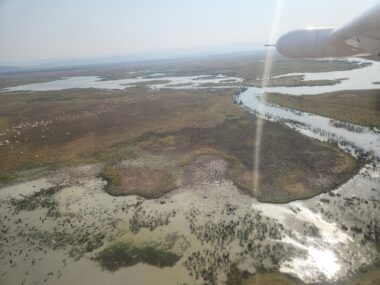Researchers from the transdisciplinary research group Revitalising Informal Settlements and their Environments (RISE) will be speaking at the World Health Summit Regional Meeting 2024 in Melbourne, Australia from 22-24 April.
RISE researchers are available to comment on how the program is working at the intersections of health, environment, water and sanitation, and climate stressors.
RISE is trialling a new water-sensitive approach to water and sanitation management in informal settlements across Makassar, Indonesia and Suva, Fiji.
RISE works with communities, governments, local leaders and partner institutions, involving co-design of location-specific solutions that integrate green infrastructure, such as constructed wetlands, to strengthen the whole-of-life water and sanitation cycle, diversify available water sources, and improve resilience to flooding.
Underpinned by the discipline of ‘planetary health’, the success of RISE is measured by the health and wellbeing of residents – particularly children under five years of age – and the ecological diversity of the surrounding environment.
Speakers:
- Professor Karin Leder, RISE Co-Director
- Professor Diego Ramirez-Loving, RISE Co-Director
- Mere Naulumatua, RISE Fiji, Senior Engagement Specialist
- Professor Tony Wong, RISE Director, Scale Up, Water Sensitive Cities Australia
The following can be attributed to Professor Leder:
“Informal settlements suffer from poor access to safe water, sanitation, overcrowding, vulnerability to diseases and climate change impacts like flooding. These conditions affect residents' physical, emotional and financial health. The problem and its solutions are multi-disciplinary and multi-dimensional – and a planetary health approach is needed to capture the broad potential impacts on health and to inform policies and investments to improve living conditions for residents of informal settlements around the world.
“That vision gave birth to the RISE program. Our ambitious program aims to improve human, environmental and ecological health in informal settlements. It creates a new approach to understanding the interconnections between human and environmental health, provides urban water and sanitation services to underserved communities, and simultaneously also delivering robust research to prove its impact and value.”
The following can be attributed to Professor Ramirez-Lovering:
“The informal settlements of today are the middle-class communities of tomorrow. And they are continuing to grow at an extraordinary rate. By innovating in the ways we plan and deliver sustainable urban infrastructure, we can make an impact in these communities and the broader city they are a part of.
“The process of taking a water-sensitive approach and trialling green infrastructure in informal settlements is charting a new path in sustainable urban development.
“Beyond the novel infrastructure itself, one of the elements of the RISE approach which I believe to be the most paradigm-changing, is our intensive co-design process with residents – where communities play a critical role in developing solutions and building resilience in the process.”
The following can be attributed to Mere Naulumatua:
“About 1 in 5 people in Fiji's urban population live in informal settlements. The sooner we recognise and embrace the principle that informal settlements are integral to a city’s make-up, the better chance we have of making our cities fairer, liveable and thriving places.
“Improving peoples’ quality of life is actively on the Government’s agenda. And RISE is an important partner assisting the Government to identify new approaches and best practices for upgrading and developing informal settlements in Fiji. It’s incredibly exciting to see nature-based solutions and green infrastructure feature in Fiji’s plans for sustainable urban development.”
The following can be attributed to Professor Wong:
“Taking water-sensitive infrastructure — which has been proven over decades to deliver improvements in developed countries — and delivering it in informal settlements is a critical step toward addressing complex urban challenges with new solutions.
“Through programs like RISE, Australia is committed to ambitious and practical action on climate change, shared prosperity, and supporting resilient communities in the Indo-Pacific. We are showing it is possible; that the approach can utilise local expertise and materials, can align with local government policies, and can be economically effective.
“With this greater clarity on the future, together with our partners we are seeding the pathways for upscaled programs like RISE to have whole-of-country impact, within and beyond informal settlements, in Indonesia and Fiji, and the wider region.”
About Monash University’s presence at the World Health Summit
Together with our partners, Monash University is proud to be hosting the 2024 World Health Summit Regional Meeting in Melbourne from 22 - 24 April, where leaders in Global Health will come together to shape the agenda for better health and wellbeing in Australia and the Asia-Pacific.
GENERAL MEDIA ENQUIRIES
Monash Media
T: +61 (0) 3 9903 4840
E: [email protected]


